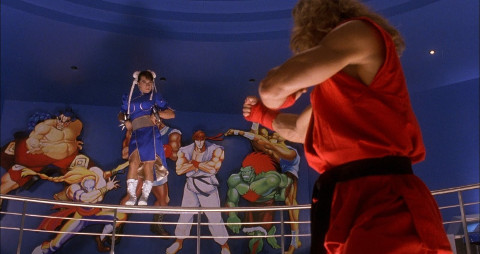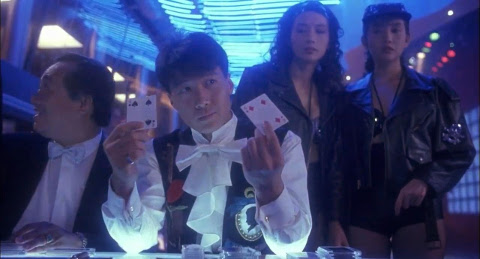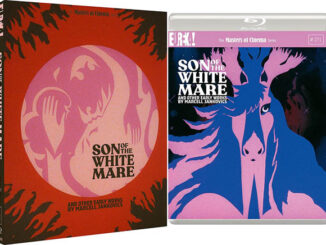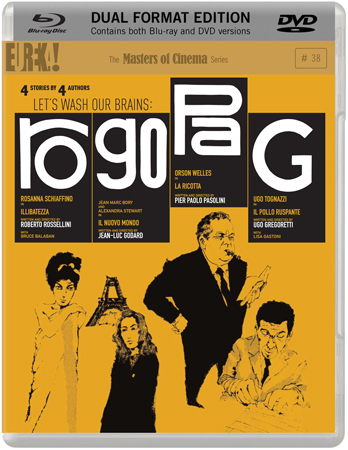City Hunter (1993)
Directed by: Wong Jing
Written by: Tsukasa Hôjô, Wong Jing
Starring: Chingmy Yau, Jackie Chan, Joey Wang, Kumiko Goto
AKA SING LIP YAN
Hong Kong
AVAILABLE ON BLU-RAY: NOW, from EUREKA ENTERTAINMENT
RUNNING TIME: 99 mins
REVIEWED BY: Dr Lenera, Official HCF Critic
Private investigator Ryo Saeba and his assistant Kaori Makimura are assigned to locate Shizuko Imamura, the runaway daughter of the CEO of a prominent Japanese newspaper. Kaori leaves in the middle of the search, unhappy with the way Ryo ignores her romantic feelings for him and flirts with other women. Ryo follows Shizuko onto a luxury cruise liner, the Fuji Maruchase, not knowing that a terrorist gang led by MacDonald have plans to hijack and take the rich passengers hostage.…
I guess that this review may be more favourable to City Hunter then some others – but I’m not going to apologise for this. I’ll say right now – call me mad – but I love City Hunter, and there are times when I think this is my favourite Jackie Chan movie, despite being fully aware that Chan’s not too keen on it himself. It’s probably not one of his very best – but best and favourite can be two very different things. It doesn’t contain any of Chan’s best fighting, best stunt work, best acting etc. It’s just a ridiculously goofy live action cartoon taken at a furious pace and crammed with jokes, gags and just plain insanity. Even if you find the constant silliness grating or the humour not to your cup of tea, you have to admire at least the incredible energy, the crazy imagination and the fact that it was all done on a fairly low budget because Chan’s films had been getting more and more expensive and, while still usually hits, were therefore making less money. And how can any fan of martial arts movies not love the sight of Chan taking on-screen guidance from no less than Bruce Lee? For me, City Hunter is one of those films that I can put on and will instantly cheer me up no matter how bad a time I’m having – meaning that I will perhaps have a harder time picking out its flaws then some other reviewers.
It was based on a manga and anime TV series, though derived little from them and the lustfulness of Ryo Saeba was toned down. Made in-between Police Story 3: Supercop and Crime Story in a typically busy year for him, it was actually not directed by Chan but by Wong Jing, who either as director or writer churned out loads of low budgeted moneymakers of an often exploitative – not to mention careless – kind, though he did sometimes make a genuinely good movie such as God Of Gamblers or Naked Killer. Well – he directed the majority of the film, but Chan helmed the fight scenes, while Ching Siu-Tung took over the famous Street Fighter sequence, where the character E. Honda was changed to E. Honde because Chan had a contract with the Mitsubishi car company, and Honda was the name of a rival company. Wheels On Meal’s Keith Vitali was Jing’s choice to play MacDonald, but Chan wanted Richard Norton and got his wish. It was shot on both the Golden Harvest and the Shaw Brothers studios as well as on an actual cruise ship. After the initial shooting of the sequence by the swimming pool, people working on it felt that the women in the background of the scene were not pretty enough, so Wong moved filming of the sequence. However, the production was rushed towards the end to get it into cinemas for the Chinese New Year, while Chan dislocated his shoulder performing the skate board chase and was wheelchair bound for a few days. Both these facts explain why Chan is doubled so often in this film. It was another hit for Chan, but the ‘international’ version removed a musical number, leading the viewer to wonder why the singers show up later in the film with no introduction. Most versions outside of Hong Kong also incorrectly subtitle or dub two particular lines for politically correct reasons.
City Hunter takes place in a world where the fourth wall can be broken, characters can run wild and pretty much anything can happen. Saeba’s introductory scene has him tell the viewer who he is against differently coloured backdrops, then his partner Makimara gets him to promise that he won’t seduce Kaori his sister before dying from bullet wounds. A nice transition to the future and little Kaori is a young woman. Saeba wonders if he can reconsider his promise and Makimara briefly comes back to life in a photograph to shout: “You Can’t”. If this makes you laugh then City Hunter is definitely for you, though some do undoubtedly find much of the humour too broad. Saeba dreams of being in a swimming pool surrounded by lovely ladies, while the smitten Kaori thinks that his rude comments whilst dreaming [actually referring to his dog] are about her. Then for little apparent reason we get a skateboard chase which has Saeba and his pursuers jump out of a high window and land on their feet to the road below. There’s an outrageous skate jump over a car, but it’s clearly edited together from several different shots. Never mind, then begins a hilarious running gag of Saeba constantly being hungry and always finding his chances of getting some food taken away from him. This idea reaches either its high point or its low point [it depends on your taste] when Saeba imagines that a woman’s arms and legs are pieces of chicken and her breasts are burgers in buns.
Whether you chuckle at this kind of thing or not, there’s so much thrown in here that one almost forgets that there aren’t any major fights until half way, and one also almost forgets the plot [plot did you say?]. It seems like MacDonald and his gang of crooks want to take over the ship which is full of rich folk [is this Under Siege on LSD?]. Two female Japanese agents Saeko Nogami and an unnamed companion are also on board determined to stop him. Teenage runaway Shizuko Imamura, accompanied by her repulsive cousin Rocky, is another passenger, followed by Saeba, who sneaks on board inside a sack barely bigger than his head. Oh, and there’s ultra-cool gambler Kao Ta with a particularly lethal deck of cards who should have been given more screen time. And that’s about it as much of the film is taken up by absurd set pieces. Those wanting lots of kick-ass martial arts may be disappointed – Chan does get to fight fellow martial arts experts Gary Daniels and Richard Norton [who fought Chan again in Mr Nice Guy], but Daniels isn’t required to perform any complex moves and his first encounter with Chan has the two virtually remaining in the same spots as they kick and punch each other. The brawls all soon turn into silliness – though you can’t say that’s not appropriate to the film. The almost surreal Street Fighter scene has Chan and Daniels transform into characters from the game in a far more faithful few minutes than all of that Jean-Claude Van Damme/Kylie Minogue effort. Chan, of course, plays in drag again as Chun-Li. He also fights some goons in a cinema showing Game Of Death, one of them a tall black guy paralleling Bruce Lee’s opponent Kareem Abdul Jabbar we see upon the screen, and uses some Lee moves to even the score somewhat before going full-Chan on them in a nice way of both tipping the hat and showing how he’s also moved on and developed his own screening fighting style which is very different to Lee’s.
Some of the more sexist humour [Carol Wan as Saeko’s friend falls forward because of her large breasts not one but three times], a touch of homophobia, and violence against women [is this a Sammo Hung film?] would probably get moaned about if the film were released in today’s increasingly restrictive times. In providing new subtitles, Eureka have bravely decided to allow many fans of the film to read the more accurate “black devils” and “You three damn gays, I hope you all die of aids” being spoken for the first time. I detest revisionism for PC reasons so I commend their decision, though I’m surprised that the film has still retained its ‘12’ rating. Much of the violence is of course comic and of the kind where someone can get brutally bashed about twenty times and still be fine five seconds later. But there’s no doubt that, in watching the film with a more critical eye, the cruder humour, plus scenes like loads of people being machine-gunned to death, doesn’t sit too well with the more kid-friendly stuff, as if they couldn’t decide who to aim the film at. I reckon that Wong initially planned it as more of a children’s film but then couldn’t resist adding more and more stuff closer to his own sensibilities. But it does seem that, despite the odd awkward edit, this is one of the films which Wong took some care over. In particular, its look and design is quite something. Blue and red are often combined to create a very aesthetically pleasing effect, and even the characters all dress in vivid red, black, blue and white [Chan of course!].
Despite Chan’s comments about the film, he does look like he’s enjoying himself playing a somewhat vainer [to hilarious effect when he stops to adjust his hair and clothes in what he thinks is a mirror and is seen by all the bad guys on large screens], more skirt-chasing variant on his usual screen persona – though Norton almost outdoes him for pulling ridiculous faces. Chan’s doubling doesn’t look too obvious except for the edits in certain moments, and he’s clearly running away from some explosions as usual. As he often did, he rehashes a highlight from an older movie but goes further with it, the also rather nutty Half A Loaf Of Kung Fu’s using of the female lead as a prop here elaborated upon because Chingmy Yau [yes, to these probably sexist male eyes the women are all gorgeous but do give decent comic performances too] has guns firing from all parts of her body. Saeba pretending that Macdonald’s metal bars aren’t hurting him, then wincing in pain, is also a variant on something that Chan does elsewhere and several times. Of course by this time such occurrences seems normal in the bonkers world of this film, as does a message asking for help actually having letters fly into the sky and form the words HELP ME. And I haven’t told you the half of it. The music score by Romeo Diaz appropriately sounds like silent comedy music at times. It’s largely reliant on its main theme song which has a few English lyrics, though a few other decent motifs are used for different aspects of the story. Its sheer insanity means that it will never be for all tastes, but there are those of us for whom City Hunter remains a total and utter hoot, a near classic of wonderful stupidity.
Rating: 









Eureka bring City Hunter to Region ‘B’ Blu-ray in another Ritrovata ‘restoration’, commissioned by Fortune Star, though the usual Ritrovata issues are not in evidence to my eyes. I guess some may say the picture is too bright – personally I love the garishness, it suits the film. The reds especially pop out, and grain is very well managed. Sadly the shots with opticals now look rather poor in comparison to everything else, but that’s always the case with these things. Some quick comparisons to my Hong Kong Legends DVD reveal some differences regarding the framing, with some shots having less information and others having more, though this may be close to how the film originally looked, who knows? It seems that some minor adjustments have been made to the print by Eureka who are apparently allowed to alter 2k prints from them but not 4k ones like the Police Story pair. Strange.
This time, in trying out the three Cantonese audio tracks, I found the stereo one to be my preferred choice. The slightly quieter mono of course is the original and I usually tend to prefer mono mixes on my simple set-up, but the stereo is just a bit more involving, while the 5.1 sounds like it’s pitched ever so slightly higher, though thankfully there seem to be no major additions. Previous subtitled releases that have incorporated the Happy Happy Gala song, which turns into a glorious full-on sing and dance sequence, haven’t subtitled it. Eureka’s release offers you the chance to view it with subtitles, while stating that the producers of the disc prefer it to be seen without them for some strange reason. Then again, the bonkers song, a weird celebration of youth culture performed by the Asian answer to Kid N’ Play, scarcely makes more sense when having the words to read. “Let’s buy a Harley and pretend to be a Paul”. Right. The dubbed version of the film I’ve always liked and do sometimes watch the film with. It has some extra bits of silliness in the lines. Again, the 5.1 version is a little higher pitched than the other, but it’s not a major problem.
The special features are mostly interview-based, combining the ones on the Region 2 Hong Kong Legends DVD with the ones on the Fox Region 1, with Bey Logan’s audio commentary understandably missing. There’s much of interest here though. Two Chan interviews are first. He clearly doesn’t want to talk about the film too much and skirts around his opinons of it, though in the second one he mentions how he’d like to make a sequel his way. He prefers to go into his attempts to break into America and praising Norton respectively. The Wong interview from the Region 1 has the director oddly say how he brought humour to Chan’s movies when he’d been being comedic for over a decade and a half, and mentions Norman Jewison of all people as his favourite filmmaker. Also from the Region 1 is stuntman Rocky Lai discussing how he shot two action scenes himself and had a narrow escape on the set of Twin Dragons. The remaining two interviews are from the Region 2 and may very be the most enlightening. Norton, who loves the film [respect!], goes into considerable detail about the shooting methods of the film, including saying how while having his makeup being put on one morning he saw Wong writing the next page of the script! Seemingly this kind of “making it up as you go along” practice is common in Hong Kong cinema. And Daniels, after talking about how his martial arts background and how he got into movies, talks for surprising length about the shooting of his scenes. Some nice behind the scenes footage can be seen here too. Not sure about the ambient background music during these last two interviews though. And then we have three sets of outtakes, two of them newly released. One of them is taken from the Japanese version of the film which shows more than the Hong Kong version, one was done for MTV, and one has been seemingly put together by Eureka themselves containing every outtake shot from all the others.
The cinematic lunacy that is City Hunter looks magnificent in this release, so of course the Doc Thoroughly Recommends!
DETAILS
*Limited edition slipcase [First print run only]
*Stunning 1080p presentation from a brand new 2K restoration
*Original Cantonese mono audio track [also available in 5.1 presentation]
*Optional English audio tracks [Two Versions, restored 5.1 and the original dub from the UK home video release]
*Interviews with Jackie Chan [3:37 and 7:12 mins]
*Interview with director Wong Jing [7:12]
*Interview with stuntman and long time member of Jackie Chan’s stunt team, Rocky Lai [10:56]
*The Jackie Chan Experience” – an interview with Richard Norton [15:15]
*”Evolution of a Fighter” – an interview with Gary Daniels [29:49]
*Outtakes Music Video [2:34]
*Outtakes Montage [4:32]
*Japanese Ending Credits [3:35]
*Theatrical Trailer [3:59]
*Hong Kong DVD Trailer [1:49]
*Collector’s booklet featuring new writing on the film [first print run only]








In a ’90s book about Jackie Chan, it was revealed that it was Golden Harvest (and not Wong Jing) who wanted Keith Vitali. Jing had already worked with Richard Norton on Magic Crystal, so I’m surprised that he would want Keith over him.